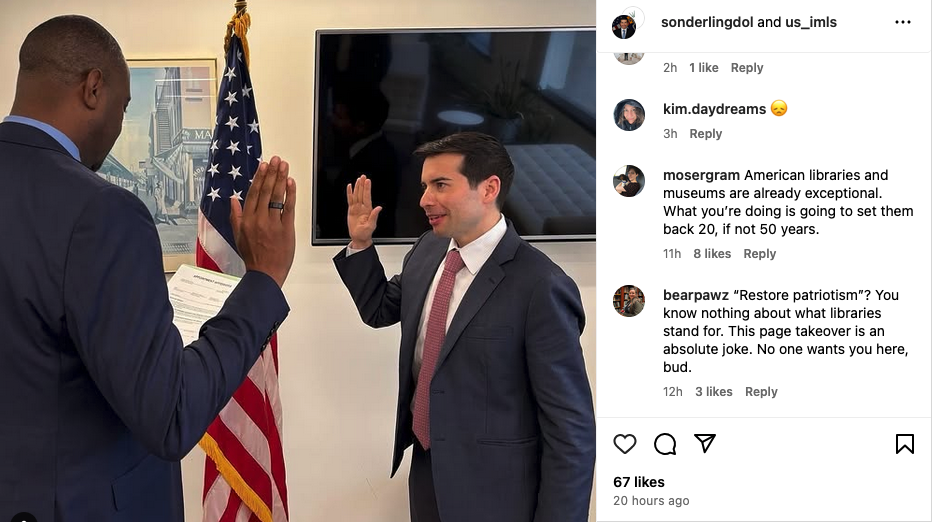The Queue: Library News for the Week Ending March 21, 2025
Among the week's headlines: a potentially chilling future for the IMLS; Alabama fires the head of its public library agency; and Texas advances a bill to give school boards control over library collections.

If you thought closing the Institute of Museum and Library Services was the worst-case scenario following Trump’s March 14 executive order, think again. The swearing in this week of deputy Secretary of Labor Keith E. Sonderling as IMLS Acting Director has raised a potentially more troubling scenario: an IMLS determined to remake libraries and museums in Trump's MAGA image.
“We will revitalize IMLS and restore a focus on patriotism, ensuring we preserve our country’s core values, promote American exceptionalism and cultivate love of country in future generations,” Sonderling said in an official statement following his swearing in this week, in which he also commits to “steering this organization in lockstep with this Administration.” In a subsequent Instagram post, Sonderling also pledged to “restore a focus on American exceptionalism in our museums and libraries.”
Over at Book Riot, Kelly Jensen leads off her must-read weekly censorship news column with a chilling, but very plausible take on what the future of IMLS might look like. “IMLS will be an agency used to produce, promote, and proliferate propaganda,” she writes. “First and foremost, ‘steering this organization in lockstep with this Administration' is the antithesis of what museums and libraries do… But by being “in lockstep” with the Administration, it’s clear that the IMLS will not be supporting the range of projects and initiatives it has been since its inception. Instead, it will support projects, ideas, and institutions which align with pre-approved values and beliefs aligned with the oligarchical ruling class.”
Since the March 14 executive order, the news of Trump’s targeting of IMLS has dominated the library headlines in local media outlets across the nation. At Library Journal, Gary Price has rounded up the coverage, which offers a strong reflection of just how much libraries are valued, and how much damage the administration’s plans for IMLS will do.
Here at Words & Money, we first reported on Wednesday night that union officials were "made aware" that IMLS employees would likely be placed on administrative leave. As of press time, it remains unclear whether that has happened or what the plan is for IMLS staff. But since Trump’s executive order gave agency officials seven days to deliver a plan to the Office of Management & Budget, we are likely to know soon what will happen to staffing at IMLS, as well as with the grants already funded and approved for FY 2025.
In American Libraries, Alan Inouye, ALA's interim associate executive director for public policy and advocacy, called Trump’s executive order targeting IMLS “a five alarm fire.” “We’ve all seen the news about the unjustified, ill treatment of federal employees across many agencies, and now it has come squarely to the library community,” Inouye wrote. Inouye told Words & Money that ALA is also "vigorously exploring legal possibilities" in response to Trump’s order.
Furthermore, Inouye wrote a letter on behalf of ALA to newly installed IMLS executive director Keith Sonderling, offering the ALA’s take on the agency’s statutory requirements. “The President may not impound appropriated funds and decline to spend money that Congress has appropriated and directed IMLS to expend,” the letter states. “To the extent funds have been appropriated by Congress, their disbursement and expenditure is a statutorily mandated act which may not be terminated by Executive Order.”
EveryLibrary also issued a statement this week calling on IMLS to fulfill its statutory obligations—and to resist Sonderling’s pledge to act in “lockstep” with the Trump administration. “We call on Congress, particularly committees with jurisdiction over IMLS, to exercise oversight of implementing the March 14, 2025 Executive Order to ensure that IMLS remains faithful to its statutory obligations and does not become a tool for ideological influence,” the statement reads.
For the Guardian, ACRL president Leo S Lo has a good piece on what’s at stake in the battle over IMLS. “The challenges libraries face today…reflect a troubling political shift and they threaten to undermine America’s economic strength, educational equality and democratic foundations in ways we cannot afford,” Lo writes.
The Alabama Reflector reports that the board of the Alabama Public Library Service has fired its executive director, Nancy Pack. Since 2023, Pack had been under enormous pressure to embrace censorship and to cut ties with the American Library Association. “This is an awfully dark day for Alabama libraries and the people of Alabama,” said the one board member who voted against Pack’s dismissal. “Dr. Pack is being terminated, not because of her performance because over her tenure state aid for local libraries has increased 60%. She is being terminated because of unfounded attacks by extremists, including on this board, because she is not sufficiently supporting censorship.”
In addition, the Reflector reports that at the same meeting, the ALPS voted to defund that Fairhope library for refusing to censor books. In a statement, advocacy group Read Freely Alabama blasted the move. “Ignoring the voices of Fairhope taxpayers and library patrons, the APLS Board, four of whom are openly in bed with Moms For Liberty and Clean Up Alabama, revoked Fairhope Library’s funding, ignoring the board’s due process for challenged materials and ignoring, once again, the parents of Alabama who have spoken in support of intellectual freedom,” the statement reads. Meanwhile, EveryLibrary is hosting a fundraiser to replace the funds pulled from Fairhope by the APLS, which has already raised nearly half of its $40,000 goal.
Tess Vrbin reports for the Arkansas Advocate on the introduction of a new bill, Senate Bill 536, that seeks to dismantle the state library and would require libraries to censor allegedly inappropriate materials. “The 28-page SB 536 would delete all mentions of the State Library from existing state statute and make ‘prohibit[ing] access to age-inappropriate materials to a person who is sixteen (16) years old or younger' a condition of public libraries receiving state funds from the education department,” Vrbin reports, adding that “the legislation defines ‘age-inappropriate material as "books, media, or any other material accessible at a public library containing images or explicit and detailed descriptions of sexual acts, sexual contact and human genitalia.”
The Texas Tribune reports that the Texas Senate has passed a bill that would give politicians the final say over which books can be available in Texas schools. “Senate Bill 13 would represent an overhaul of how schools decide what books are placed in their libraries." The bill now heads to the Texas House, the report notes, adding that the bill would give “school boards, rather than librarians,” the final say over which new books or materials can be put in school libraries. “Additionally, the bill would not allow schools to have library materials that have ‘indecent content or profane content,’ which can include books that use grossly offensive language."
In Colorado, local affiliate Denver 7 reports a major win for freedom to read advocates as a federal judge has ordered a school district to return 19 banned books to library shelves. “The injunction comes after the American Civil Liberties Union (ACLU) sued the Elizabeth School District back in December for removing the books from libraries. The suit argued the book removals violated federal and state free speech protections.” The action arose after the Elizabeth Board of Education created “a sensitive topic book catalog," comprised of 138 books, "including several classics and other books identified as highly sensitive.”
I mean, really? Reuters reports that U.S. authorities are “closing Canadian access to a library straddling the Canada-U.S. border.” The Haskell Free Library and Opera House is situated between the towns of Stanstead, Quebec, and Derby Line, Vermont, but in a statement to Reuters, a Department of Homeland Security spokesperson said "drug traffickers and smugglers were exploiting the fact that Canadians could use the U.S. entrance without going through customs.” The report says there is no evidence to back up that claim. Vermont Senator Peter Welch called the report "troubling," and on his X feed said the library "celebrates a partnership between our two nations."
And how exactly is this serving your constituents? In a puzzling story, the Idaho Capital Sun reports that Idaho lawmakers have moved accept only half of a federal grant to the state's libraries to help increase Internet access for Idahoans—after initially trying to kill the entire amount. “The money for the grant was all from the federal government; there was no request for state general fund money from the Idaho Commission for Libraries for the grant,” the Sun noted, with one lawmaker explaining that the opposition was somehow tied to a law passed last year, House Bill 710, “that regulates so-called ‘harmful materials’ in libraries,” without explaining precisely what the connection is. Another rep said the state's librarians have “implored” legislators to accept the federal funds. “We heard about computer classes ready to be offered to seniors teaching about cybersecurity and helping folks understand the danger of clicking on links from emails that maybe they don’t know who the sender is. Telehealth for the rural communities. Computer access for veterans who want to access their VA services,” the rep said.
And finally, an interesting episode of Close All Tabs features Brewster Kahle, who talks about the legal challenges facing the Internet Archive, and what’s behind them. You can listen or read the transcript.
“If we’re found guilty of being a library and then that will cost us, yes, it would snuff out the Internet Archive. And that may be the point,” Kahle says at one point, referring to a copyright infringement lawsuit by a group of record labels that seeks more than $600 million in damages. “The bigger picture that’s going on and the real contest is not about money,” Kahle adds. “It’s actually about control. Can libraries own anything in the digital world?”


